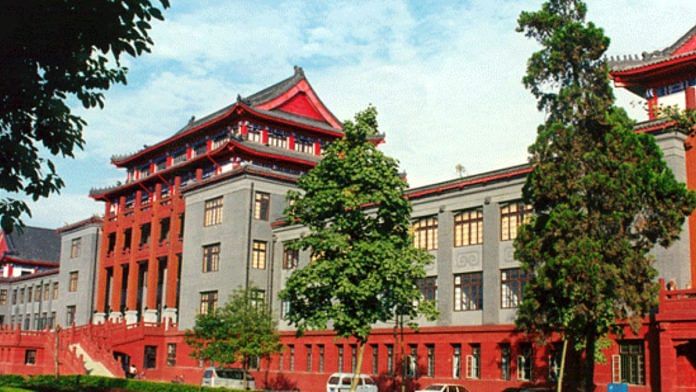Military tensions in Eastern Ladakh have affected academic exchange between India and China. In the past, Sichuan University and others welcomed Indian scholars to develop research initiatives, but the border stand-off has brought the university-level exchanges, which served as a Track-II level dialogue, to a grinding halt.
China experts in India told me that invitations to Chinese universities have been frozen and that they are now looking to develop academic partnerships with Taiwanese colleagues.
Galwan changed it
In March 2019, the 2nd Track-II dialogue was held between Institute of South Asian Studies, Sichuan University and Center for Chinese Studies, Manipal University along with Institute of Chinese Studies, New Delhi in Haryana’s Manesar. State Councilor Dai Bingguo, National Security Advisor Shivshankar Menon, and over 40 political figures and scholars from India and China gathered for this dialogue.
The primary focus was on economy and trade, while border issues, defence, and security received less attention. It was a time when both sides showed willingness to engage in business while temporarily setting aside the border dispute.
Subsequent editions of the Track-II dialogues did proceed, but the level of engagement was significantly curtailed following the June 2020 clash in Galwan.
The 3rd and 4th editions of the dialogue, held virtually in 2020 and 2021, involved Sichuan University and the Manohar Parrikar Institute for Defence Studies and Analyses. It remains unclear whether the 5th round of the talks, originally planned for 2022, took place as scheduled.
“It takes only one party to impair a relationship, but takes two countries to build good relations. China-India relations should be a two-way street of mutual respect, accommodating each other’s concerns while promoting win-win cooperation, not a one-way street that one side raises requests and sets conditions while the other is forced to make responses,” said Ambassador Sun Weidong during the 4th Track-II dialogue in 2021.
The 3rd and 4th rounds of talks didn’t present a path forward as both India and China talked past each other. The military tensions have made these dialogues ever more important, but both sides have nearly stopped all the academic exchanges.
During the 4th dialogue, Sun Weidong, then-ambassador to India, called out ‘some Indian people’ for referring to China as India’s ‘major threat’ or ‘strategic rival’. Since Weidong’s departure from office in 2022, Beijing hasn’t appointed a new ambassador to New Delhi.
Also read: China’s military–civil fusion policy has far-reaching implications for universities
It’s hurting scholars
Before 2020, Chinese scholars too could enroll in India for graduate programmes, including doctoral degrees.
Li Li, director of the Centre for South Asian Studies at Tsinghua University, holds a PhD from Jawaharlal Nehru University (JNU). Several Chinese scholars have studied at JNU.
Tsinghua University’s Centre for South Asian Studies says its mission is to study the “strategic culture of India, political systems of the South Asian countries, regional and sub-regional economic cooperation in South Asia, China’s policy toward South Asia, China-India relations, and the Belt & Road Initiative (BRI) in South Asia’.
But the centre’s programme over the past three years has excluded India from its discussions on ‘South Asia’.
Despite some investment in expanding India’s expertise in China, the limited interaction between the two countries has also hurt Chinese scholars. South Asian studies in China now mainly focus on studying Pakistan, Bangladesh, Nepal, and Sri Lanka, with an outsized emphasis on Pakistan.
In India, the Centre for China Studies, Ashoka University, has been actively promoting Chinese studies through a rigorous examination of Chinese history and culture. However, students studying China will face difficulties in traveling to the mainland and spending time there, as the current climate of geopolitical hostilities is unlikely to change over the next decade.
Taiwan’s an option
As invitations from Chinese universities have declined, Indian scholars have turned to Taiwanese universities for collaborations. There is a tremendous interest among India’s China experts to gain a ‘Taiwan stint’.
However, the interactions between India and Taiwan aren’t entirely new.
The Republic of China, when Taiwan’s predecessor government was located on the mainland, once funded the Cheena Bhavana (Chinese Hall) in Santiniketan, West Bengal. Established in 1937, the Cheena Bhavana began as the Indian chapter of the Sino-Indian Cultural Society, whose ‘honorary presidents’ included MK Gandhi, Nehru, Chiang Kai-shek, and Chiang’s wife, Soong Mei-ling.
After India officially recognised the People’s Republic of China on 1 April 1950, the legacy of scholarly interactions between British-ruled India and Taiwan took a backseat.
As geopolitics continues to influence relations between Beijing and New Delhi, Indian scholars must again rely on Taipei to understand Beijing. The road to Zhongnanhai now passes through Roosevelt Road in Taipei.
The author is a columnist and a freelance journalist. He was previously a China media journalist at the BBC World Service. He is currently a MOFA Taiwan Fellow based in Taipei and tweets @aadilbrar. Views are personal.
(Edited by Prashant)



